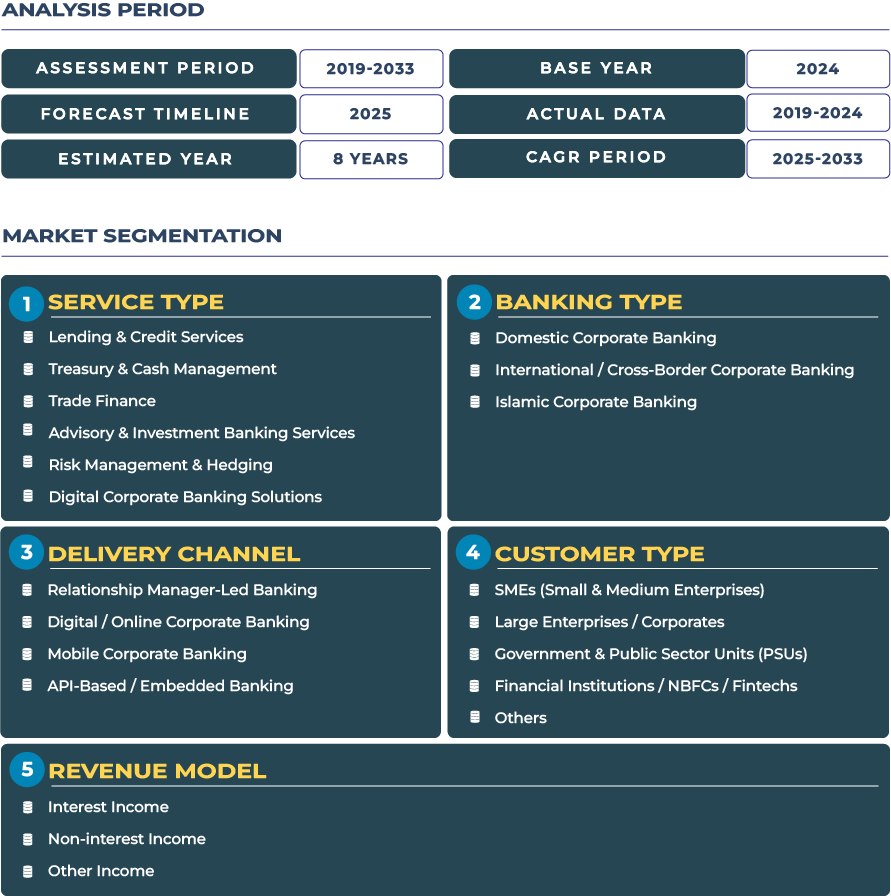Cross-Border merger and acquisition and Transaction Advisory Services in Spain: Strengthening Corporate Expansion Beyond Borders
Spain corporate banking market is undergoing a strategic evolution as domestic banks enhance their advisory and financing capabilities to support cross-border mergers, acquisitions, and corporate expansion. With Spanish enterprises increasingly venturing into Latin America, Western Europe, and North Africa, demand for merger and acquisition advisory, transaction financing, and foreign exchange risk management is rising. Banks are aligning their corporate banking solutions to the internationalization ambitions of Spanish corporates, particularly in sectors such as renewable energy, infrastructure, manufacturing, and hospitality.
Note:* The market size refers to the total revenue generated by banks through interest income, non-interest income, and other ancillary sources.
The Spain Corporate Banking Market is valued at USD 40.3 billion in 2025 and is projected to reach USD 52.8 billion by 2033, reflecting a CAGR of 3.4%. This sustained growth is supported by Spain’s robust export base, government-led innovation programs, and an expanding mid-market segment. As capital markets stabilize post-pandemic and corporate liquidity improves, banks are capitalizing on higher demand for structured financing, trade credit, and advisory solutions. Despite global headwinds from geopolitical tensions and inflationary cycles, Spain’s financial institutions continue to demonstrate resilience through disciplined credit management and digital innovation.
Driving Growth Through Export-Oriented Credit and Infrastructure Financing
A core driver of the Spanish corporate banking industry lies in the financing needs of export-driven SMEs and multinational corporations that form the bedrock of the country’s industrial and tourism ecosystem. Exporting businesses are increasingly seeking flexible credit facilities and working capital financing to manage currency exposures and international receivables. The government’s export credit agency, CESCE, has also reinforced its support mechanisms, enabling banks to extend credit guarantees that mitigate risk in volatile foreign markets.
Infrastructure and renewable energy projects represent another key growth pillar. Spain’s corporate banks are facilitating syndicated loans and project financing for large-scale solar, wind, and transportation initiatives aligned with the Ministry of Economic Affairs and Digital Transformation’s sustainability goals. The country’s strategic focus on renewable energy transformation is opening new pathways for investment, advisory, and long-term lending partnerships between financial institutions and developers. Simultaneously, the tourism sector, a significant contributor to GDP, continues to attract corporate credit demand for renovation and expansion projects as foreign travel rebounds.
Challenges Limiting Corporate Banking Growth in a Competitive European Landscape
While Spain corporate banking sector shows steady momentum, structural constraints persist. High regional unemployment in certain provinces, especially in southern Spain, reduces credit demand from smaller enterprises and affects repayment confidence. Additionally, the banking sector’s comparative scale remains smaller than that of major EU peers, constraining capital allocation for large corporate deals and slowing innovation cycles.
The Spanish economy’s exposure to external demand volatility, particularly in tourism and hospitality, adds another layer of complexity. Seasonal business cycles affect corporate loan utilization and liquidity management. Although digital transformation is progressing rapidly across large banks such as BBVA and Banco Santander, many mid-sized institutions still face technological integration gaps that limit their competitiveness in the digital treasury and cross-border transaction segments. Overcoming these challenges will require a sharper focus on regional credit inclusion, financial literacy, and digital ecosystem partnerships.
Emerging Trends and Opportunities Defining Spain Corporate Banking Ecosystem
One of the most dynamic shifts within the corporate banking landscape is the widespread adoption of instant payments and real-time treasury solutions. Spanish corporates are increasingly demanding 24/7 liquidity visibility, multi-currency management, and frictionless payments, accelerating the adoption of open banking frameworks across major financial institutions. The development of SEPA Instant and API-based transaction tools has redefined operational efficiency for export-oriented firms.
Another significant trend is the expansion of renewable project financing across Spain’s energy corridors. Corporate banks are collaborating with public entities to structure long-tenure, sustainability-linked loans that align with EU Green Deal objectives. These projects not only promote ESG compliance but also strengthen Spain’s energy independence. Furthermore, banks are bundling corporate FX, receivables, and hedging services to help companies manage their exposure in volatile global markets, a particularly valuable proposition for tourism, logistics, and manufacturing businesses.
Emerging opportunities lie in digital working capital solutions for SMEs that automate credit assessments and optimize liquidity flows. Spanish banks are also leveraging blockchain-based trade finance networks to reduce document handling times and fraud risks. In the near term, the integration of advanced analytics into credit scoring and risk assessment frameworks is expected to redefine client servicing standards and enhance lending transparency.
Competitive Landscape: Strategic Shifts Toward Digital Corporate Banking and Sectoral Specialization
Spain corporate banking sector is dominated by major institutions such as Banco Santander, BBVA, and CaixaBank, each intensifying their focus on innovation-driven corporate services. In 2024, Santander expanded its SME digital banking suite by introducing a Working Capital+ Platform that automates credit and treasury management for mid-sized firms. BBVA, in March 2024, announced a major partnership with fintech startups to integrate cross-border FX solutions for corporate clients engaged in international trade.
CaixaBank, meanwhile, has advanced its leadership in sustainability-linked project finance by sponsoring renewable energy infrastructure under Spain’s National Energy and Climate Plan (NECP). These initiatives not only strengthen Spain’s economic base but also enhance the global competitiveness of its corporate banking institutions. Foreign players such as BNP Paribas and HSBC have also expanded their footprint in Spain, focusing on trade finance and merger and acquisition advisory. The intensified competition underscores the industry’s evolution toward high-value advisory services, digital treasury ecosystems, and ESG-driven financing strategies.







